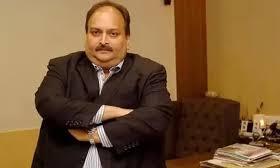A court in Antwerp has approved the extradition of fugitive diamantaire Mehul Choksi to India, confirming that his arrest by Belgian authorities on India’s request was lawful, officials said on Friday.
The order marks a significant step forward in India’s efforts to bring Choksi back to face trial in the ₹13,000 crore Punjab National Bank (PNB) fraud case.
Officials said Choksi has the option to appeal the decision in a higher court in Belgium. “The order has come in our favour. The court has termed his arrest by the Belgian authorities on India’s request valid. The first legal step in getting him extradited is now clear,” a senior official stated.
Belgian prosecutors, supported by officials from India’s External Affairs Ministry and the Central Bureau of Investigation (CBI), presented strong arguments outlining Choksi’s role in the massive PNB fraud case. They told the court that he remains a flight risk and cannot be released from prison, the officials added.
After hearing arguments from both the Belgian prosecutors and Choksi’s defence team in mid-September, the court ruled that his arrest was valid. Choksi, 66, was detained in Belgium on April 11, 2025, following an extradition request from the CBI. His bail pleas have been rejected by multiple courts in the country.
India has assured the Belgian authorities that, once extradited, Choksi would be lodged in Barrack No. 12 of Mumbai’s Arthur Road Jail. The government said there would be no overcrowding or solitary confinement, as the cell is designed to house more than one economic offender.
In a communication sent on September 4, the Union Home Ministry informed Belgian authorities that the jail’s living conditions meet the standards set by the Committee for the Prevention of Torture and Inhuman or Degrading Treatment or Punishment (CPT) of Europe.
India also provided detailed information about the cell. It measures about 20 feet by 15 feet and includes a separate toilet and washroom, ventilators, and a grilled main door for air circulation. The cell is equipped with a clean cotton mat, pillow, bedsheet, and blanket. Officials assured that it would be swept and mopped daily, with access to clean drinking water, outdoor exercise, and rest areas.
The prison also offers board games such as chess, carrom, and badminton, as well as Art of Living yoga sessions. Inmates have access to English and regional newspapers, terrestrial television channels, video conferencing, and telemedicine services. Family visits are allowed once a week, while meetings with lawyers are permitted daily.
Choksi, along with his nephew Nirav Modi, is accused of orchestrating a ₹13,000 crore fraud in PNB by using fraudulent Letters of Undertaking (LoUs) in collusion with bank officials at the Brady House branch in Mumbai.
Nirav Modi, who was arrested in 2019 in London, remains in a UK jail and is contesting his extradition to India. Both men are wanted under the CBI and Enforcement Directorate’s (ED) cases.
The CBI’s extradition request also cited the United Nations Convention against Transnational Organized Crime (UNTOC) and the United Nations Convention against Corruption (UNCAC). Two open-ended arrest warrants issued by a special court in Mumbai in 2018 and 2021 were shared with Belgian authorities as part of the process.
According to investigators, officials at PNB’s Brady House branch issued 165 LoUs and 58 Foreign Letters of Credit (FLCs) during March and April 2017. These were issued without sanctioned limits or cash margins and were excluded from the bank’s central system to avoid detection.
Based on these LoUs, several foreign banks — including SBI (Mauritius and Frankfurt), Allahabad Bank (Hong Kong), Axis Bank (Hong Kong), Bank of India (Antwerp), and Canara Bank (Manama) — extended credit to Choksi’s companies.
When the accused companies defaulted, PNB was forced to pay ₹6,344.97 crore (USD 965.18 million), including interest, to the overseas banks that had provided credit against the fraudulent LoUs and FLCs. This finding was detailed in the CBI’s supplementary chargesheet in the PNB fraud case.
